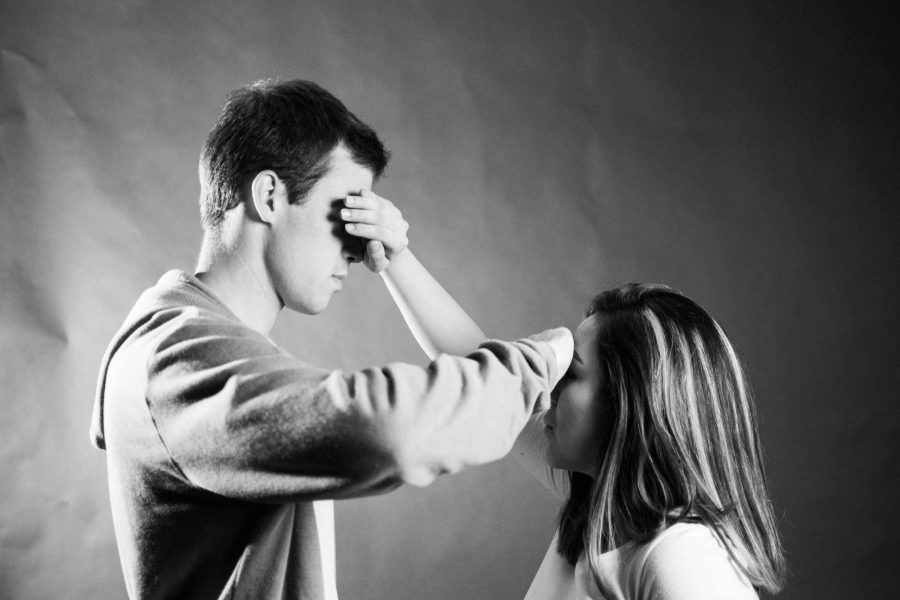Stop saying you’re colorblind
Two Moorpark students depict the idea of “colorblindness” and how it can hinder the way we view a person. Photo credit: Gabrielle Biasi
May 10, 2016
Sassy, demanding, and curious as a cat, I was no different than most preschoolers at four years old. With my princess lunchbox and curly hair, my life was pretty great, and my biggest worry was probably missing the next showing of “Blue’s Clues.” As I child, I lived a privileged life. I never dealt with poverty or abuse or health issues, or racism.
You might be thinking to yourself: what preschooler still has to deal with racism in today’s forward-thinking society?
Tragically enough, thousands of children begin encountering racism before they even make it to kindergarten.
In a new government study on discipline in our country’s public schools, half of all out-of-school suspensions are black children, despite them making up only 18 percent of preschoolers.
Something doesn’t add up in those numbers. If children of color begin facing racism before they can even write, there’s no telling how that might affect them psychologically in their future. We should all tackle these issues and discuss why certain races struggle more than others, but many people criticize the discussion of racial issues. They claim that by talking about race, it only adds more fuel to the fire, and instead we should ignore skin color and treat everyone equally. We should all just be “colorblind.”
I have an issue with this colorblind ideology. We as humans are all born into diverse families with an incredible myriad of cultural differences that should be noticed and celebrated. These people that claim they are “colorblind” or that they don’t see race, that we’re all part of “one human race,” are unknowingly spreading a toxic outlook on diversity.
Psychologist Monnica T. Williams on Psychology Today, published an article in which she argues why colorblindness is dangerous.
“Blind means not being able to see things. I don’t want to be blind,” says Williams. “I want to see things clearly, even if they make me uncomfortable. As a therapist I need to be able to hear and ‘see’ everything my client is communicating on many different levels.”
Williams also offers a positive alternative to colorblindness, known as multiculturalism, which celebrates ethno-racial differences.
“It recognizes that each tradition has something valuable to offer,” Williams explains. “It is not afraid to see how others have suffered as a result of racial conflict or differences.”
It’s not wrong or controversial to look at a black person and recognize the fact that they are black. What is wrong is looking at a black person, refusing to accept their identity, and refusing to accept the fact that they are forced to struggle with things that white people never even have to have a second thought about.
Comedian, activist, and Internet personality Franchesca Ramsey, discusses this in her video “Just Stop Talking About Race!!”
“Even in black and white, I’m still black,” Ramsey says. “There is nothing wrong with seeing my race and my color, it’s part of who I am.”
I myself have always identified as a person of color, but I am what is known as “white passing.” This means that although I am of Hispanic and Latin culture, I don’t look it; therefore I won’t experience certain situations the way a more ethnic-looking person would.
I won’t be ridiculed as being ghetto for wearing cornrows or hoop earrings, or be stared at accusingly if I wander in a convenience store for too long. My skin color gives me privilege, and this realization was an incredibly valuable step in my understanding of the struggles people of color face. I didn’t know this as a four-year-old, but I know it now and I believe being educated on racial struggles is vital in creating a better future for all humans.
Colorblindness, no matter how well-intentioned the people who preach it are, is not the key to equality. It is the erasure of someone’s identity. It refuses to come to terms with the fact that not everyone experiences getting pulled over by police the same way. Not everyone gets denied jobs based solely on the way their name sounds. Not everyone gets ridiculed for the texture of his or her hair. By not acknowledging a person’s race or ethnicity, you refuse to acknowledge the inequalities and injustices people of color face.
I urge you to stop being colorblind, and instead appreciate the vibrant array of culture and color the world has to show.








